Berlin Startup Salary Report
An analysis of earnings in Berlin’s entrepreneurial landscape
Berlin’s reputation as ‘poor but sexy’ precedes it. International, creative people have long been drawn to its liberal diversity, and facilitated by low costs, the city became the perfect place to spark a disruptive tech scene.
Now, as supportive infrastructure grows and the scene matures, Berlin’s entrepreneurial culture is flourishing. This in turn makes the city very attractive to the young and ambitious, and so the cycle continues.
According to the Institute for Strategy Development (IFSE), which recently published its report on the tech hub called Booming Berlin: A Closer Look at Berlin’s Startup Scene, startups are a major employer of internationals:
The 620,000 registered foreigners in the city make up 16.5 percent of Berlin’s total population. The city is a long way ahead of the German average (8.9 percent of total population). According to Berlin Partner, 186 different nationalities reside in the city. This is not only reflected in the multicultural cityscape but also within the startup scene. With 49 percent of its startup employees not being German citizens, Berlin’s startup workforce is more diverse than Silicon Valley’s (45 percent foreign workers) and only topped by London according to the Global Startup Ecosystem Report.
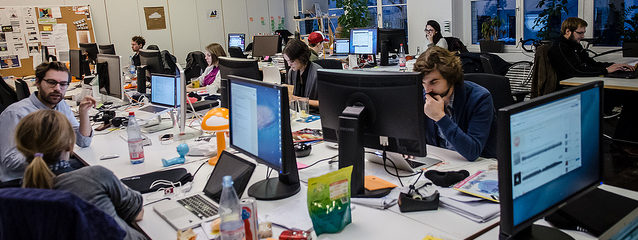
So, Berlin is clearly still considered a sexy place to live, but is it still poor? That’s surprisingly hard to define. What people earn in Germany is a closely guarded secret, making it difficult to find conclusive salary information. It’s especially tough for job seekers, as salary ranges are not advertised alongside job descriptions, with little indication of what people are paid for the positions they occupy.
This lack of basic transparency makes it hard for job candidates to know what to expect from a position or how much bargaining power they have during salary negotiations. Thus, there is a pressing need to provide people with reliable information that could allow them to better understand the local jobs market.
As Berlin is a key hub of the European tech scene, it is crucial that job seekers – both local and international – understand precisely what they can expect financially in order to make the best decisions for their careers.
To that end, BerlinStartupJobs.com has hosted an anonymous survey since April 2013, which asked respondents to share details about their salaries, their work experience, their industries and their level of contentment with their current roles. Participants could also provide additional feedback about their roles and their experience of living and working in Berlin. The entire survey and graph plots can be found in the appendices.
In Brief
Berlin has arrived as a startup destination with better pay and happier employees!
Berlin has evolved into a leading European startup hotspot. The first comprehensive startup salary survey in Germany shows that Berliners earn higher salaries and experience more job satisfaction.
Berlin startups have an extreme gender pay gap!
Among full-time startup employees in Berlin, the median salary for males is €3,333, while females reported a median salary of €2,500. That’s a difference of almost 25%!
Software Developers and Managers earn the highest salaries.
With little to no experience, software developers earn a median starting salary of €2,900, while managers at the start of their careers earn a median of €2,500. Study IT, people!
University dropouts earn more than graduates.
Although they comprise just 6% of respondents, people who have dropped out of university reported higher salaries than college graduates.
The German minimum wage made little difference to intern salaries.
Despite the fact that Germany introduced a minimum wage of €8.50 per hour in January 2015, interns still seem to be falling through the loopholes financially.
Sales and Marketing roles pay the least.
Although roles in sales and marketing may be spun as excellent entry points to lucrative careers, often this is not the case. These roles frequently offer poor financial prospects.
People who work in Berlin startups are happier.
Despite lower salaries people who work in startups report to be happier than those who don’t. Similarly, people who live in Berlin are happier than those who don’t. Coincidence?
People who work in startups tend to feel underpaid.
Happy though they may be, people who work in Berlin startups tend to feel like they’re paid less than they’re worth.
Work experience has a strong positive influence on salaries.
Experience is one of the strongest driver of high salaries, meaning that when it comes to earning high wages, working hard is the most important determinant.
Berliners are less experienced but more likely to work for startups.
People who live in Berlin tend to be less experienced that their peers that live outside of Berlin. However, these people are also far more likely to work for a startup.
Survey Highlights
The Berlin Salary Survey was answered by 3,388 respondents, 60% of whom already reported to live in Berlin. There was a very high concentration of non-German respondents (nearly 80%), likely to have been influenced by the survey’s availability solely through the English language.
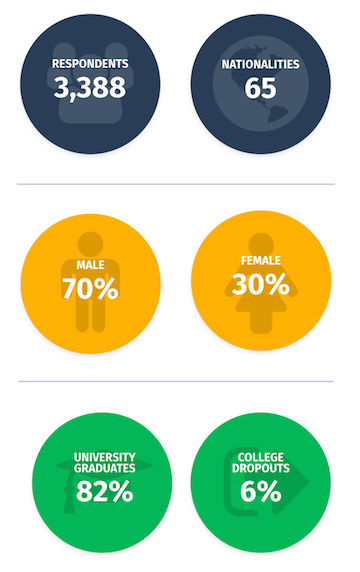
As the IFSE report quoted above states that the percentage of non-German nationals working for startups in Berlin is 49%, this survey is clearly quite heavily weighted towards international respondents.
Respondents were quite young, with the majority (over 40%) falling into the 26 – 30 age bracket. Those that lived in Berlin were significantly less experienced than those who weren’t already resident in Berlin. Berlin-based respondents were also far more likely to work for a startup.
As one might expect, people who did not work for startups earned significantly higher salaries than those who did. Despite this, and perhaps somewhat unexpectedly, Berlin residents reported salaries that were notably higher than those who did not live in Berlin.
Respondents reported to be vastly unhappy with their current positions, with women reporting to be significantly unhappier than men. The majority of respondents also felt underpaid, but startup employees tend to be much happier than those who do not work for startups. This is perhaps unsurprising given that the source of the survey is a startup jobs board.
Almost 82% of respondents hold a university degree, with 2.5% having obtained a Ph.D. 6% reported to have dropped out of university and interestingly, these respondents reported to earn higher salaries than university graduates, surpassed only by the Ph.D holders.
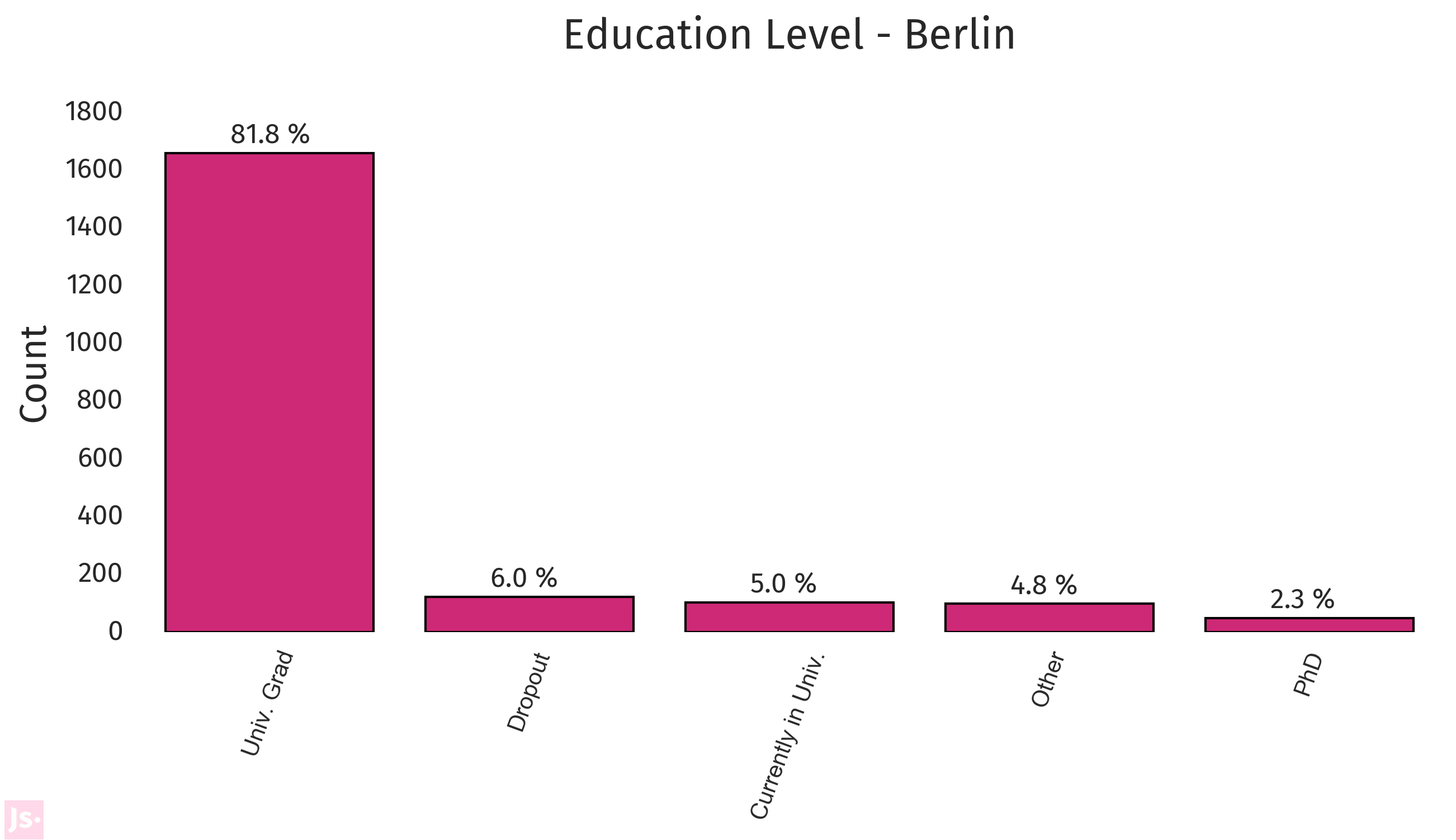
Taking just full-time positions – the majority contract type – a higher level of work experience is a substantial driver of higher salaries. The age of the startup a person worked for has a much less significant influence on how much they earned.
The respective median monthly gross salary for entry level positions – not internships – clocks in at €2,337, while those with 3 – 5 years experience take home a monthly median salary of €3,080. As would be expected, the more experience a respondent declared, the higher the median salary. Those with 6 – 10 years of experience earn a median of €3,845, and more than 10 years experience sees respondents taking home a median salary of €4,603.
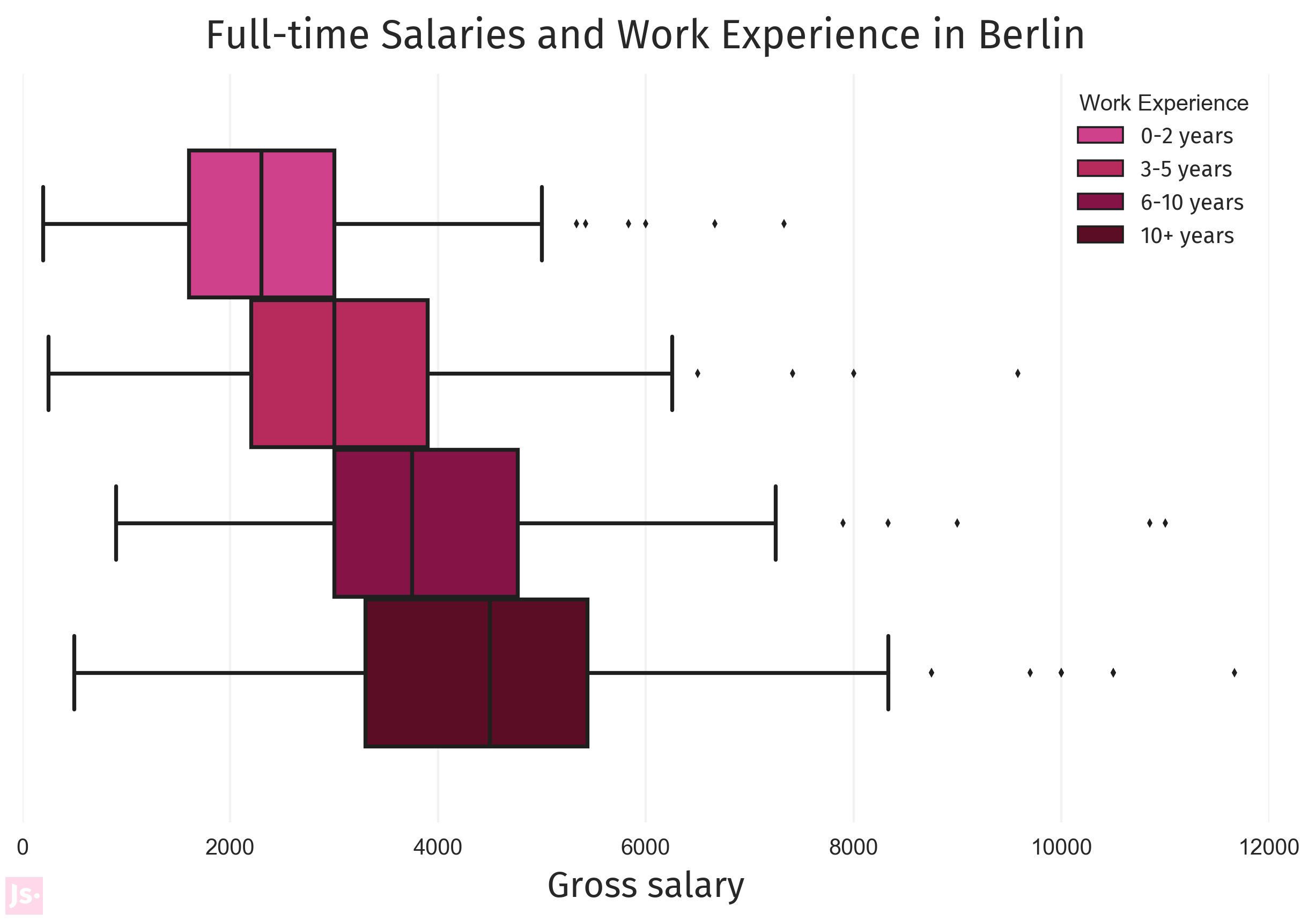
It won’t come as much of a surprise that the highest earners in Berlin are software developers and managers. The median starting salary for a software developer is €2,900 monthly, rising to a median of €5,000 monthly for those with 10 or more years of experience. Management salaries start a little lower at a monthly entry-level median of €2,500, with highly experienced managers out-earning software developers at the same experience level by taking home a monthly median salary of €5,300.
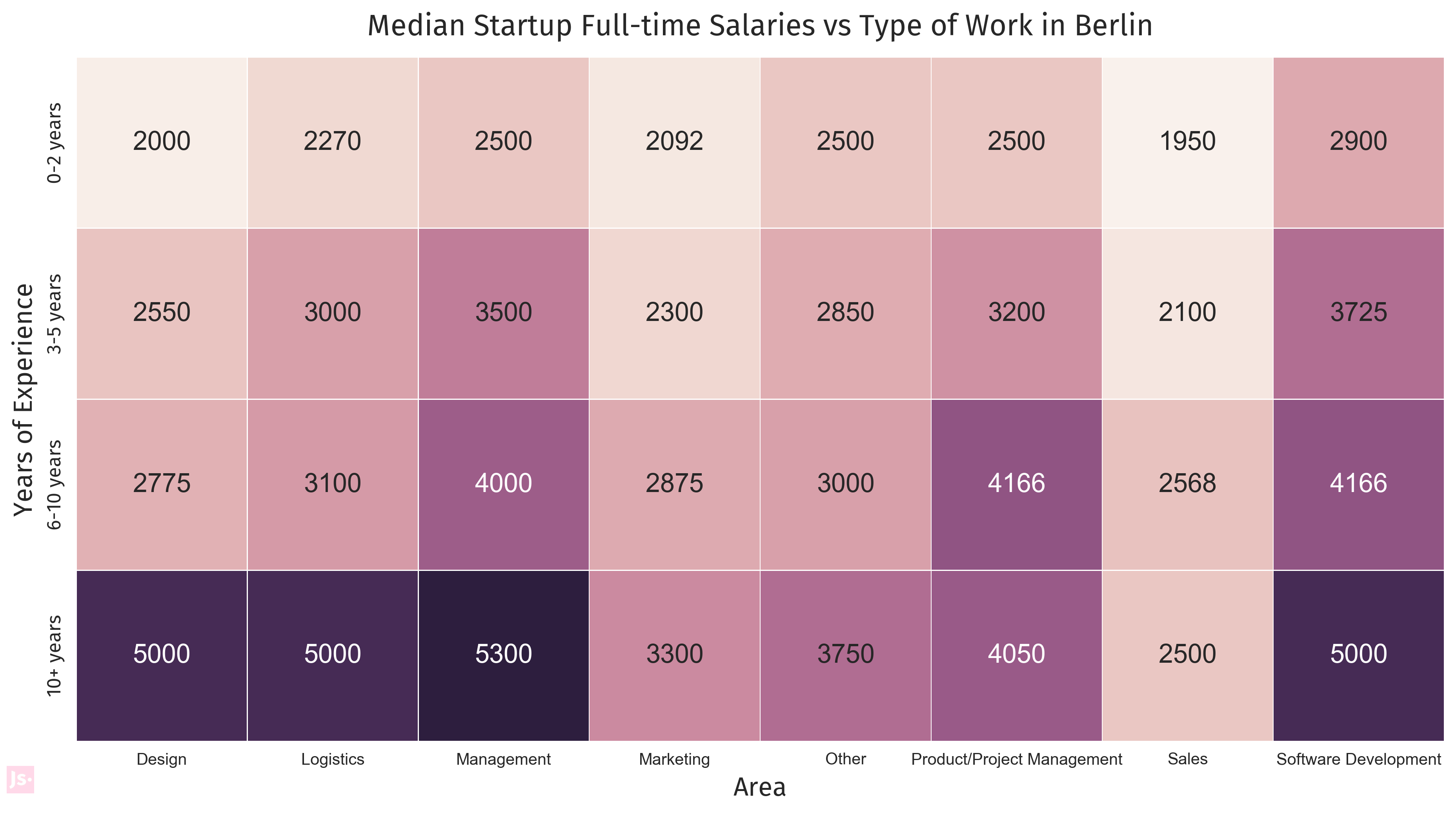
While startups may have a reputation for being more progressive and inclusive than large corporate machines, they still have a lot of work to do when it comes to salary inequalities. The gender pay gap is considerable, with sizable salary differences between male and female respondents.
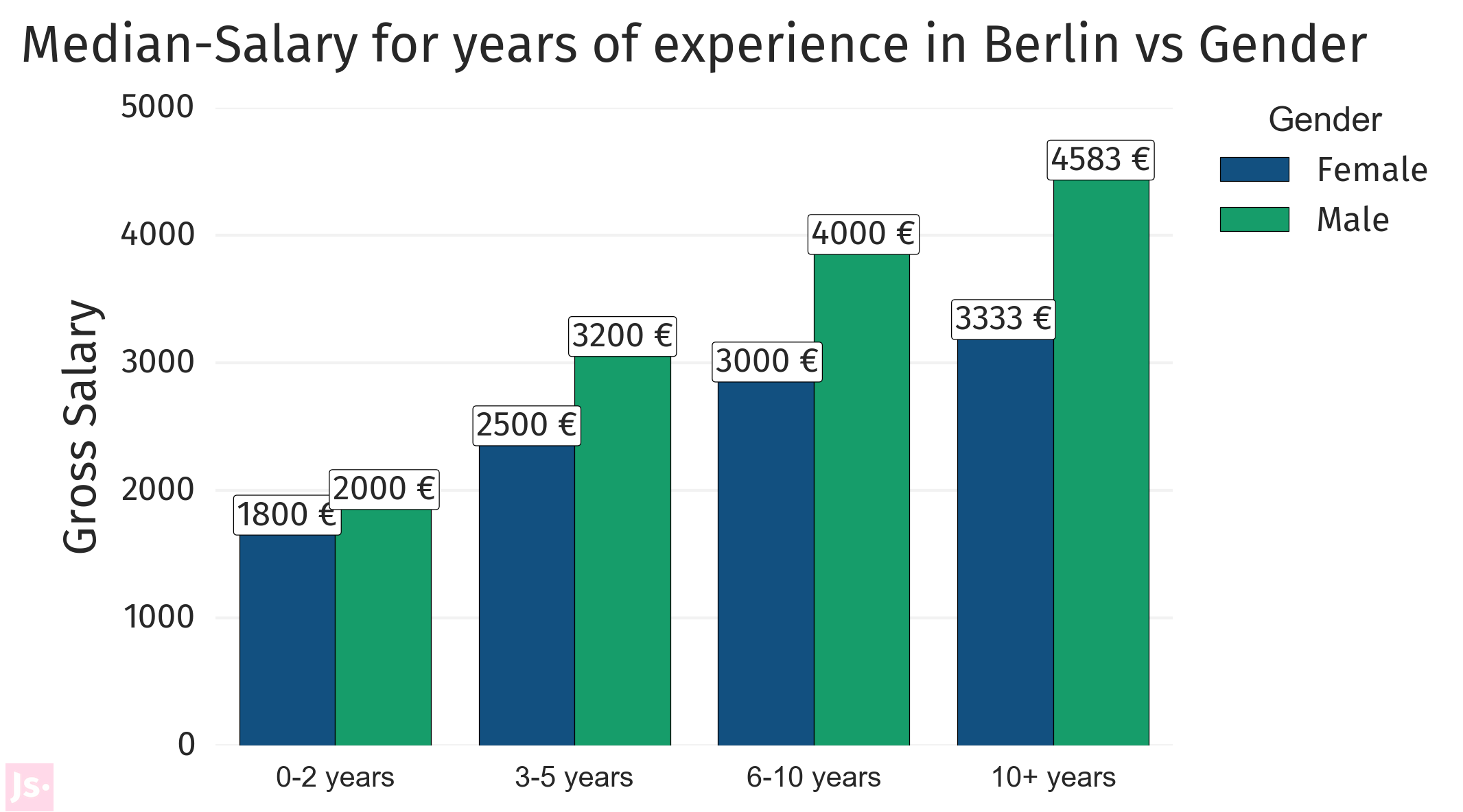
Men are being paid significantly more than women across all job areas and experience levels both for the Berlin and non-Berlin samples. In fact, the gap is even wider in Berlin. According to Eurostat estimates, the average gender pay gap across the EU is 16.4%, while in Germany the average is 22.4%. The Berlin Salary Survey shows a gap between median male and female salaries of almost 25%.

Conclusions
There are some clear limitations in the scope of the Berlin Salary Survey in that its respondents are chiefly international, likely to already be active job seekers and therefore probably more likely to feel underpaid or be unhappy in their current roles. However, the data offers some interesting insight into the current financial landscape of Berlin employees.
Median salaries before tax in Berlin are generally comparable to many other startup hubs, meaning that the city is perhaps a more appealing destination for those who want to work in a startup and still maintain a high quality of life.
However, there are also some obvious drawbacks, with low prospects for financial growth if you don’t work in areas like software development, management, or design. Women too, might consider the city less rewarding in terms of earning prospects, but now know that they can negotiate more assertively for remuneration equal to their abilities. The information provided in this report will hopefully make it easier for eager job seekers to make informed professional and financial decisions that will boost their careers.
Berlin remains an incredibly attractive destination for those seeking employment, and the thriving startup scene will continue to be a driving force of innovation, change, creativity and success in the heart of Europe.
Berlin Startup Salary Report on SlideShare
Learn More
DOWNLOAD EXECUTIVE SUMMARY (PDF)
DOWNLOAD FULL REPORT (PDF)
Authors:
Jan Backes, M.Sc Information Science
Prof. Dr. rer. pol Ingo Scheuermann
Hessam Yosef Lavi, M.Sc Cognitive Science
Robin Eric Haak, MBA
A Collaboration Between:
BerlinStartupJobs.com is the leading platform for inspiring jobs in the German capital. It was founded in 2011 with the aim to connect startups in Berlin with talented professionals.
Aalen University is the leading research institution among the Universities of Applied Sciences in Baden-Württemberg. One of the key missions of Aalen University is to deliver a focused education to our 5,700 students by combining the developments in industry with the latest research findings. The institution builds on this tradition by expanding its research capabilities and intensifying its relationship with firms. Its unique innovation centre Inno-Z established in 2015 serves as a business incubator for our graduates and facilitates the transfer of innovative products and processes between the University and the industry.
Jobspotting is a recommendations engine that suggests relevant jobs to users based on their skills and experience. The engine is powered by Skills Graph and Semantic Analysis technology. The company was founded in 2013 in Berlin, Germany and is today active in 10 countries on 4 continents.
Photo Credits: Berlin Startup Tour by Heisenberg Media. Licensed under CC BY 2.0.



